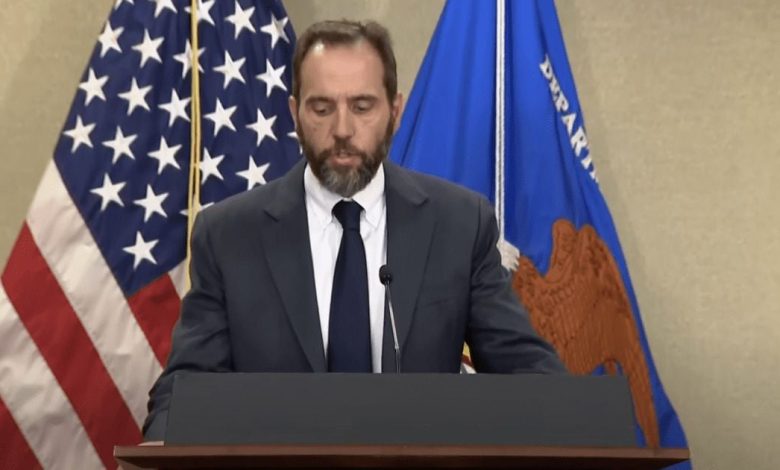BREAKING: DC Appeals Court Smacks Down Jack Smith: ‘Undermines The Presidency’

The United States Court of Appeals for the District of Columbia Circuit has delivered a striking blow to Special Counsel Jack Smith’s investigation, setting a precedent that could have future implications for executive privilege and the separation of powers.
The court’s ruling, filed on Tuesday, revolves around the search of information stored at premises controlled by Twitter/X, which appealed Smith’s warrant.
The case, which has garnered national attention, centers on the Special Counsel’s attempt to bypass traditional executive privilege protections in its investigation of former President Trump’s Twitter communications.
While the court ultimately ruled in favor of Smith on appeal, the official filing contained a brutal dressing-down of Smith’s tactics.
The court’s document emphatically stated that “judicial disregard of executive privilege undermines the Presidency, not just the former President being investigated in this case.”
The ruling criticized the Special Counsel’s approach, which included a search warrant and nondisclosure order without considering the confidentiality of presidential materials. The court noted, “This unprecedented approach is mistaken for at least three reasons,” emphasizing the departure from historical practice and the vital constitutional protection for executive privilege.
Holy sh*t: 4 judges on DC appellate court just delivered a scorching smack down of Special Counsel Jack Smith, Judge Beryl Howell, and Judge Florence Pan for search of Trump’s Twitter file.
“The Special Counsel’s approach obscured and bypassed any assertion of executive… pic.twitter.com/jwIIIxeZPB
— Julie Kelly 🇺🇸 (@julie_kelly2) January 16, 2024
One of the critical points of contention in the case was the use of Twitter by President Trump. The Special Counsel argued against Twitter’s executive privilege concerns, stating there was “no plausible reason to conclude that the former President … would have used Twitter’s direct-message function to carry out confidential communications.”
However, the court highlighted that President Trump used his Twitter account to conduct official business, raising the possibility that his account contained privileged material.
The court’s document also addressed the broader implications for the separation of powers, stating, “The absence of a presumptive privilege particularly threatens the Chief Executive when, as here, a third party holds presidential communications.”
This points to the potential for future conflicts in similar cases.
Furthermore, the court criticized the district court and the Special Counsel for their handling of executive privilege claims, stating, “Without a word, the district court and our court have flipped the presumption.”
In a resounding conclusion, the court denied the appellant’s petition for rehearing en banc, with no member of the court requesting a vote on the matter. The decision represents a huge setback for Special Counsel Jack Smith.
The court’s decision is a clear indication that the judiciary recognizes the delicate balance that must be maintained between the branches of government.
The ruling also raises questions about the future of executive privilege and how it will be treated in subsequent legal battles. The court’s emphasis on the historical practice and the need for careful consideration of privilege claims suggests a more conservative approach to handling such sensitive matters.
The court’s firm stance could very well set the tone for how similar issues are addressed in the future. Smith, a veteran prosecutor, was appointed as special counsel by Attorney General Merrick Garland to oversee the Department of Justice’s investigations into former President Donald Trump.
These investigations included matters related to the handling of classified documents at Mar-a-Lago and parts of the January 6 investigation. As the dust settles, the ruling clearly smacks down Smith’s aggressive approach.


